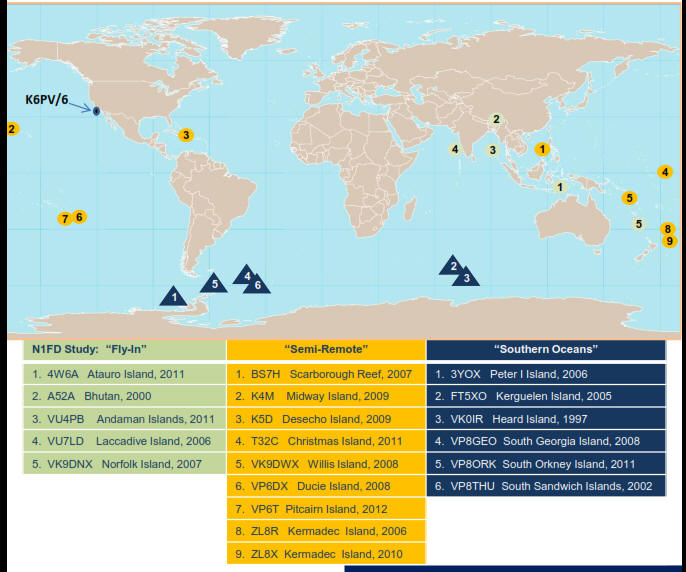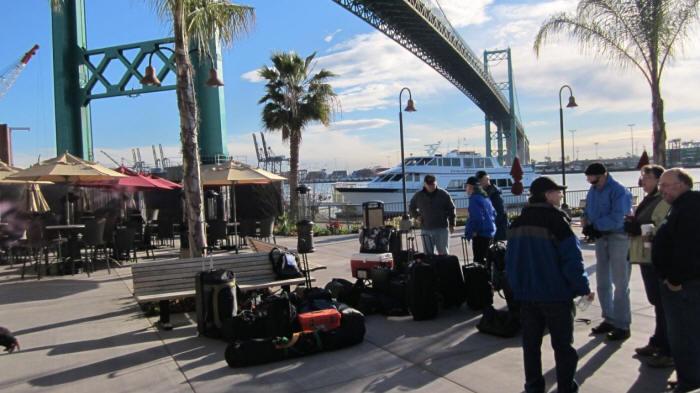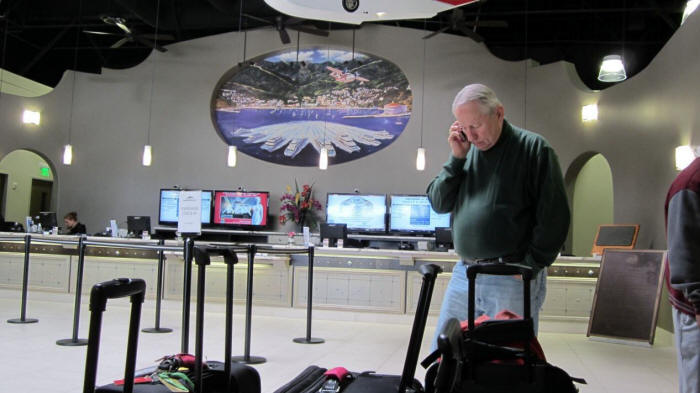Islands On The Air DXpedition
Santa Catalina Island NA-066
February 20, 2013
Anatomy of a DXpedition Cancellation:
Dollars & Sense
By Diana Feinberg, AI6DF
PVARC President
In my time on planet Earth I never used the
term “adrenaline collapse” until the PVARC’s 2013 IOTA DXpedition to
Catalina abruptly ended before it started. But it all made sense.
Our entire DXpedition team was pumped-up, packed-up, and ready to go
on Wednesday, February 20—until gale-force winds and nine-foot
swells in the Catalina Channel caused the Catalina Express ship line
to cancel almost all service that day. We waited six hours for
conditions to improve, but they didn’t.
With no boat service to Two Harbors the following day and two of our
DXpedition team members already scheduled to return on Friday
evening it wasn’t feasible to operate with a limited team for a very
limited time. Our “cost per QSO” also would have been exorbitant
(more on that in a moment).
Catalina Express’ Facebook postings tell the story




We all were disappointed and went home
after waiting at the Catalina Express terminal. And then something
strange happened: we all felt completely exhausted despite never
leaving for Catalina. Attribute that to “adrenaline collapse”, as
Donna, W6DLD--XYL of our DXpedition leader Ray Day, N6HE—reportedly
expressed it. Most of us slept 10 hours that night. I felt like I
needed several more hours.
But PVARC’s 2013 IOTA DXpedition is one of
many DXpeditions that had been canceled owing to transportation
problems or adverse weather. Some of our ham comrades have braved
worse conditions (and exorbitant costs) to reach their DXpedition
destinations. That’s especially true in remote locations or
hard-to-operate countries where the window of opportunity doesn’t
often arise.
But what’s especially telling about DXpeditions are their respective
costs—particularly their “cost per QSO”. Look no further than the
fascinating “cost per QSO” analysis which Donald Greenbaum, N1DG,
presented at the 2012 Dayton Hamvention. (N1DG of Duxbury, MA, was
inducted into CQ Magazine’s DX Hall of Fame in 2006). His entire
presentation can be viewed at: http://www.ncdxf.org/
and
http://www.ncdxf.org/misc/N1DG-DXpeditioncosts-Dayton2012.ppt
N1DG obtained the total costs for: five “Fly-In” DXpeditions where
electricity was available (analogous to our Catalina Island
situation); nine “Semi-Remote” DXpeditions (hard-to-reach places);
and six costly “Southern Oceans” DXpeditions (even harder-to-reach
destinations requiring ice breaker-rated ships and equipment for
very cold conditions). Dividing each DXpedition’s cost by contacts
yields the “cost per QSO”. The table below shows N1DG’s survey
results, to which we’ve added the 2012 K6PV/6 IOTA DXpedition’s
data. Our 2,069 QSO’s during the 2012 IOTA at Two Harbors each cost
about the same as a QSO from a “Semi-Remote” location due to K6PV’s
fixed costs (like travel) spread across only four days.

My calculations show an abbreviated
K6PV/6 DXpedition team in 2013, operating just 1.5 days yielding an
estimated 800 QSO’s, would have cost us $1.85 per QSO. That’s
getting pricey, so neither dollars nor the weather made sense this
year for K6PV/6.
PVARC’s annual Two Harbors DXpedition
isn’t in the same league as the DXpeditions N1DG analyzed. But the
fundamental economics of DXpeditions apply to K6PV/6 as well: hams
who participate in DXpeditions personally spend considerable sums
for enabling fellow hams to contact seldom-heard DX entities. As
shown in the previous page’s table, PVARC’s operators on our 2012
K6PV/6 DXpedition personally incurred almost 90% of our DXpedition’s
cost, vs. 58-66% of total costs being borne by participants in the
DXpeditions that N1DG surveyed.
I’ve plotted on the map below the DXpeditions that N1DG analyzed.
Hopefully it all makes sense now—and so do the dollars involved. But
when seas turn nasty, it really makes good sense to cancel that
island trip!

AI6DF’s
2013 K6PV/6 IOTA
DXpeditionPhoto Album
0800 hours: The team with its gear on the dock in San Pedro for the 0900 boat.

Waiting over five hours
inside Catalina Express’ San Pedro terminal.
Photo doesn’t show the cooler chests
containing our food.
Shown (L-R), Norm, K6UU (partially); Jeff, K6JW; and Bob, W6HIP.

After learning Catalina Express ships are canceled for the day, Ray N6HE notifies campground at Two Harbors and arranges refunds for all.

By Diana
Feinberg, AI6DF
PVARC President



